It was a wet and rainy afternoon at the Stadio Renato Dall’Ara between the home side Bologna and the current runners in the league, Internazionale.
Although the gap between the fiery leaders Napoli and the joint-second Milan sides is a whopping 18 points, the competition among the rest is intriguing.
Bologna has now secured seventh place in the league with qualification to European Conference League still possible. Although the fifth and sixth-placed Lazio and Atalanta are seven points away, with 14 more games to go, Thiago Motta has a real chance to create history.
Well-seasoned former PSG midfielder Motta is well-known to fans. For a midfielder, it says a lot about management if they can foster change.
Even though Pep Guardiola, Xavi Hernández, and Xabi Alonso are all Spanish midfielders-turned-managers, their insights into the game may be familiar to fans of any nationality.
The Italian-Brazilian coach Motta has worked with some of the best players in the world during his time with Barcelona, Inter, and Atletico Madrid. In this match, he faced up against one of his old teams, same as Simone Inzaghi facing his former side Bologna. Motta’s idea of trying out a new structure sparked a lot of discussion across the sports community.
Before moving to Bologna, he tried out the ambitious 2-7-2 configuration in Spezia. His unconventional 2-7-2 strategy was revealed in an interview to be a 4-2-3-1 quantified in relation to its horizontal lanes as opposed to vertical ones.
The fullbacks and the goalie would be moved towards the middle, drastically transforming the 4-2-3-1 formation. What Motta called an “offensive” approach also saw the wingers and centre attacking midfielder pushing up to lend their legs. His style was reminiscent of a high-pressing, nimble, and short-handed squad that dominates the game.
Even though he managed most of Spezia’s games, he only won 27.5% of them. As a result, his plans were put on hold while he was handled like a typical manager.
Being a homegrown midfielder with a distinct style similar to that of Pep and a select few others, his input was vital to the footballing world. In the following sections, we’ll compare and contrast the starting lineups used by the two managers and see how different their decisions have been.
This tactical analysis will examine how Motta’s squad exploited Inter’s weakness in game 24 of the current season. This analysis will also look at the tactics used by both managers.
Lineups
Motta opted for a 4-3-3 formation, which has only been utilised in little more than 8% of the club’s games this season. Goalkeeper Jhon Lucumí and central defender Joaquin Sosa were paired with 31-year-old Łukasz Skorupski to open the game. The fullbacks were teenager Andrea Cambiaso and the Austrian Stefan Posch.
Jeremy Schouten, a Dutch international, played as the team’s holding midfielder, alongside Nicolás Domínguez and Lewis Ferguson, a Scottish international, on either side. Musa Barrow, the Gambian, played in the middle of the field alongside wingers Riccardo Orsolini and Roberto Soriano.
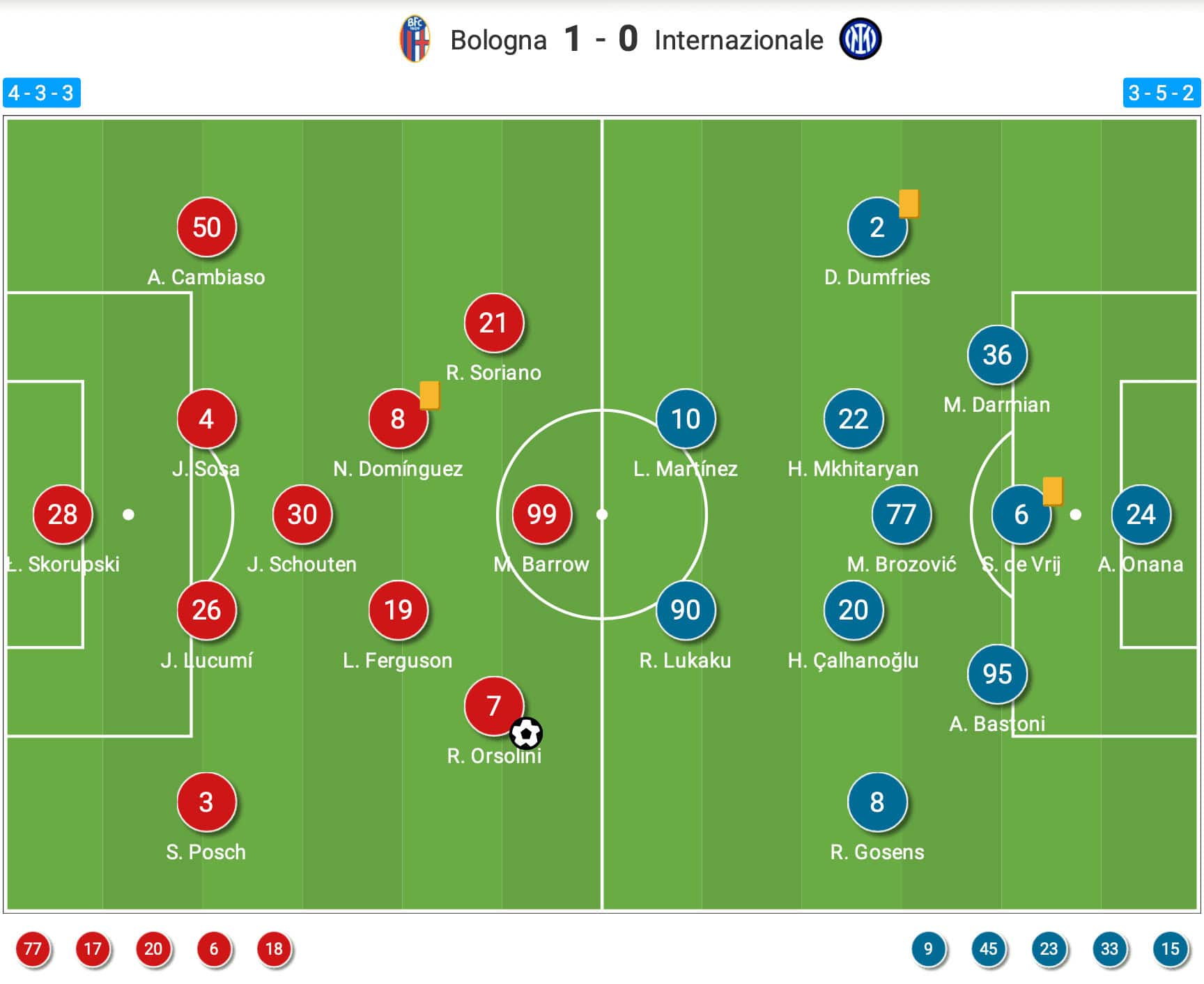
On the other hand, Inzaghi reverted to the 3-5-2 formation that has been utilised a staggering 77% of the time this season. Since moving on from Ajax, André Onana has been the unchanging goalkeeper for most of the season. The central defenders were Matteo Darmian, Stefan de Vrij, and Alessandro Bastoni.
Henrikh Mkhitaryan, Hakan Çalhanoğlu, and Marcelo Brozović formed a formidable central midfield unit, which was bolstered by the additions of Denzel Dumfries and Robin Gosens. They paired World Cup hero Lautaro Martínez with former Chelsea forward Romelu Lukaku in the attack.
How Motta’s men approached the pressing waves
The ease with which Bologna was able to break past Inter’s press was never really a factor. When Inter pressed, Lucumí saw space up front and took advantage of it to help his side get some breathing room.
Schouten took off to the wide area in an attempt to make up for the gap created by the first wave of defenders and by the winger who had snuck in behind Gosens.
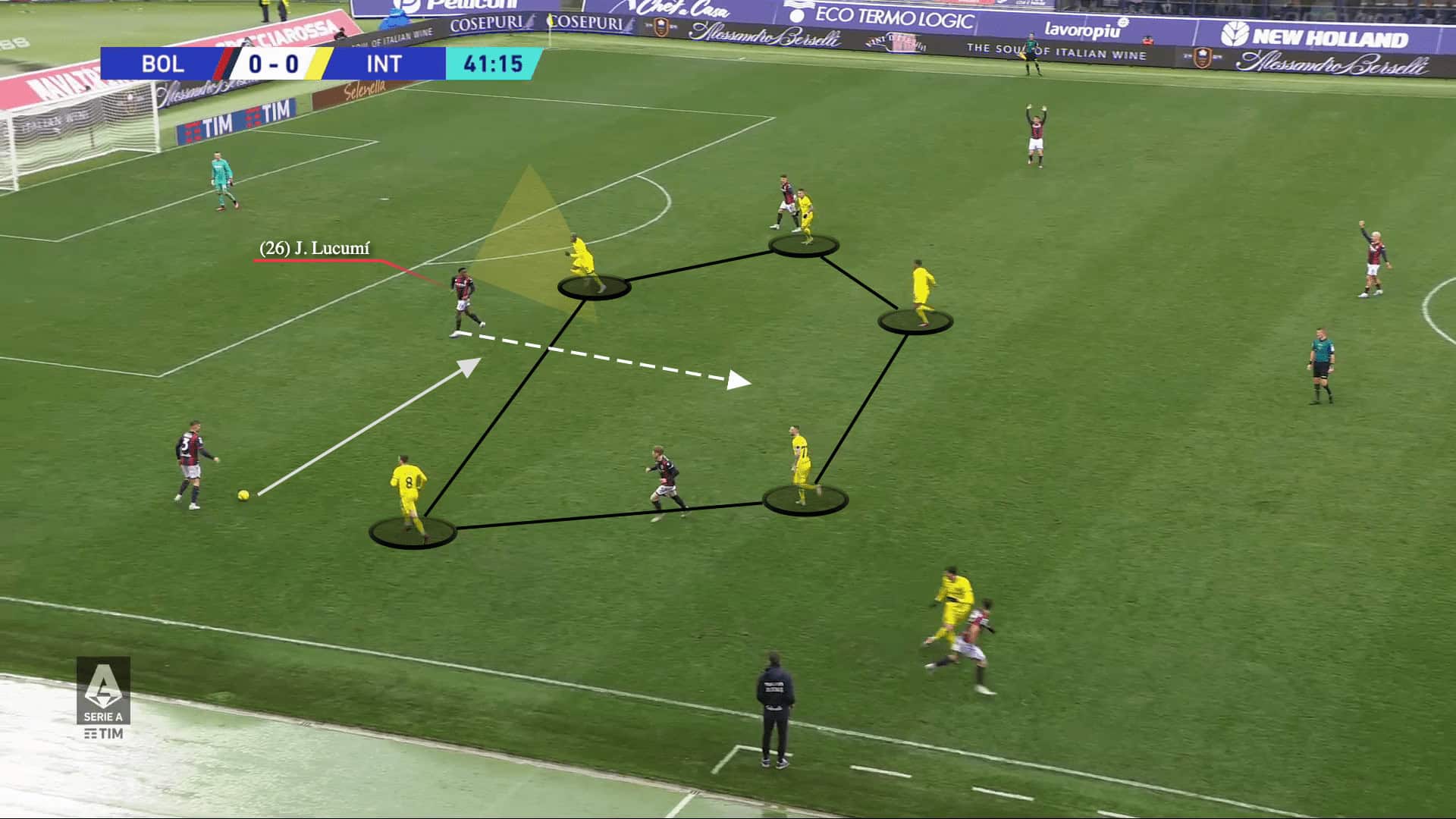
Doing these actions simultaneously adds dynamism to the team, making it more fluid as a whole. This implies the club is entering a more aspirational period in its history thanks to Motta’s honesty.
Inter’s midfield chain was a complete mess in the first half, especially after the ten-minute mark when Bologna’s comfort spread through the levels. The folks of Bologna finally realised they could succeed.
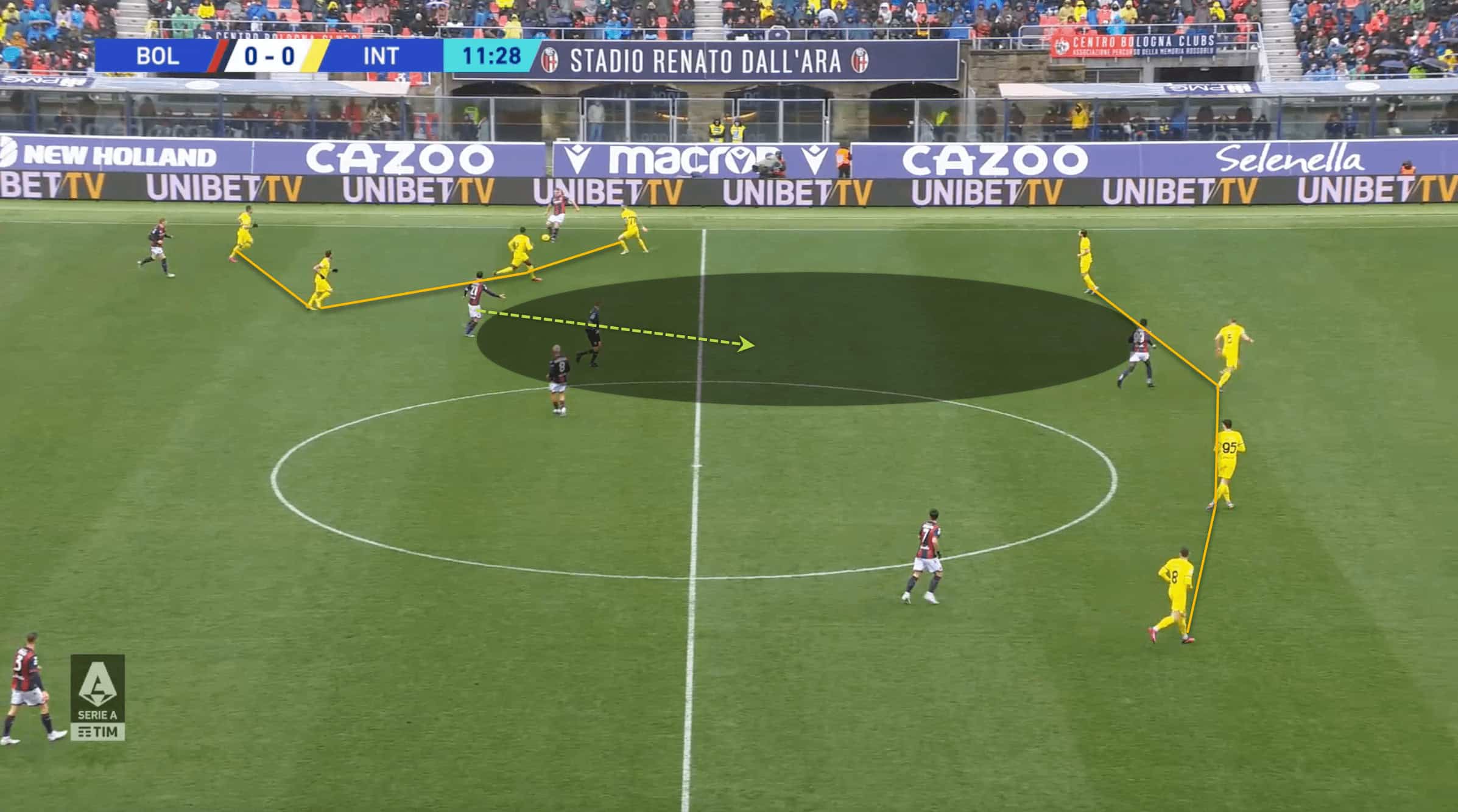
Soriano entered the structure with Domínguez on his right and Orsolini waiting far to his right. In the top image, the attack reaches its climax when Inter’s midfield is nowhere to be seen and Marrow slots the ball home only to have it disallowed for offside.
Attacking fullbacks need to practise in more lapping scenarios to improve their defensive abilities. Inter’s lapping was lighter than the hosts.
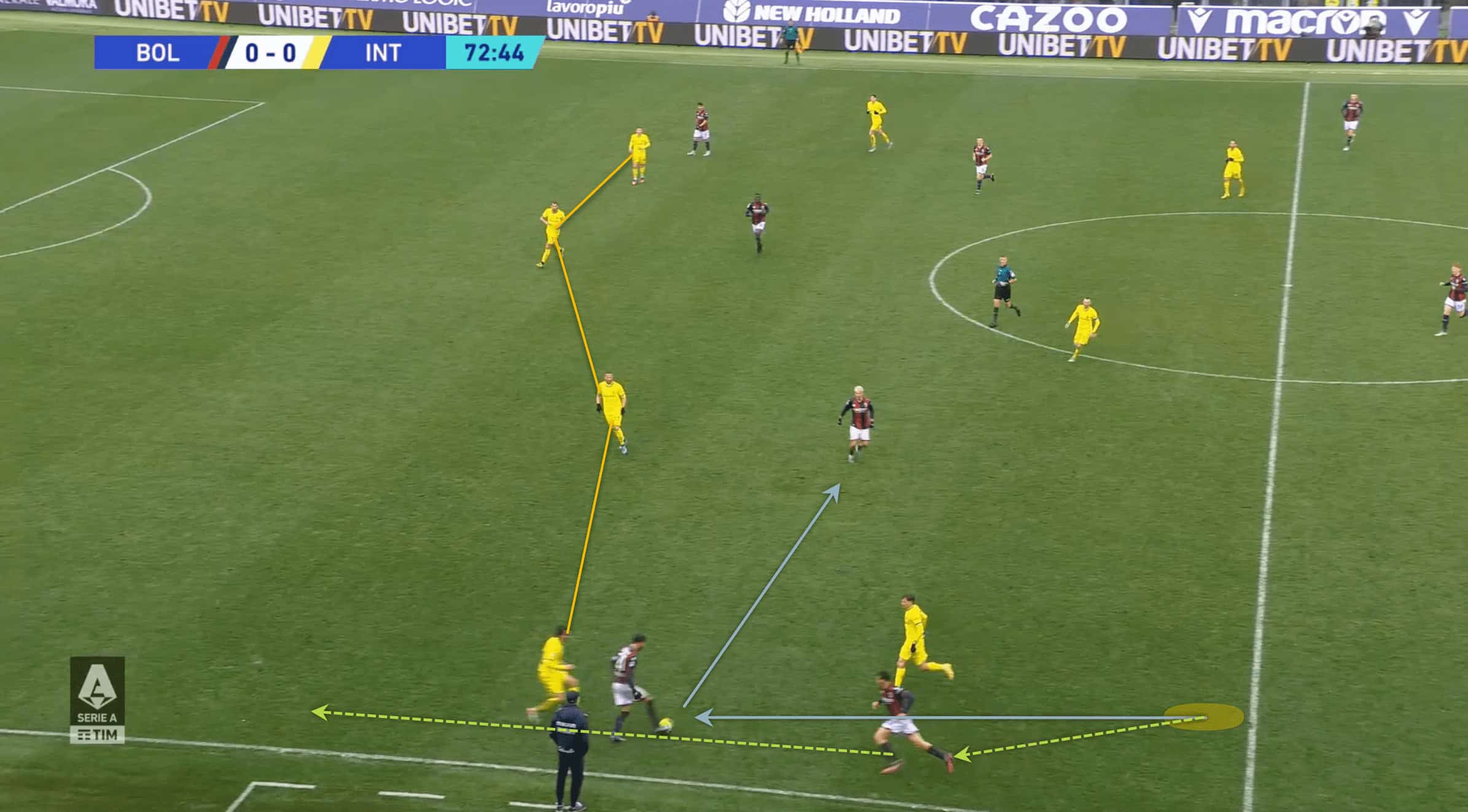
After receiving the ball, Cambiaso drove up the field to overlap his flank partner, Soriano, who then located the pass to the patient Domínguez. The Bologna number eight surprised the fullback with a beautiful pass to his feet, much to his joy.
Inter undervalued Schouten’s capabilities since they never responded to or even expected anything from him. He was never given any credit and it was a big reason why Inter lost on the road.
Via his stealthy moves behind the opposition, he emptied the sandbox in the middle of the field. Above, when Inter seemed to have the home team trapped, Schouten effortlessly darted behind the blind press.

To be a professional is to contribute in some way, and every player did just that. Each player made good first contact and completed a pass with ease. Schouten’s motion to the back caused five Inter players to be shadowed.
Commanding the game with such fluidity, the players moved out of their comfort zone to create more gaps which massively contributed to their build-up. In short order, they were able to stretch, infiltrate, and completely demolish the opposition’s framework.
Inter never came close to scoring a goal if it was for a good build-up and a finish. They just thrived for loose touches or loose balls from Bologna and the expectation was contradictory to what happened.
Bologna’s improved mid-block defending
Their defending was amazing thanks to their effortless mid-block defending. They never stayed back to maintain a low block, rather they wanted to go up and keep the pressure going.
On one occasion, after chasing one of Inter’s attacks, they wanted to keep hunting them down until they reached the other end which was a big thanks to the never-ending midfield engine.

Schouten was one of the biggest providers of this concern. His running up and down the pitch allowed the team’s midfield shape to be better at any given moment.
As in the above picture, the front two connected are Orsolini up with Barrow trying to keep up the pressure and change the formation flawlessly.

The swarming Bolognese players chased off the Inter midfielder who peeped within the tight framework. Instead of trying to find a way around or through, Inter consistently went for the nose.
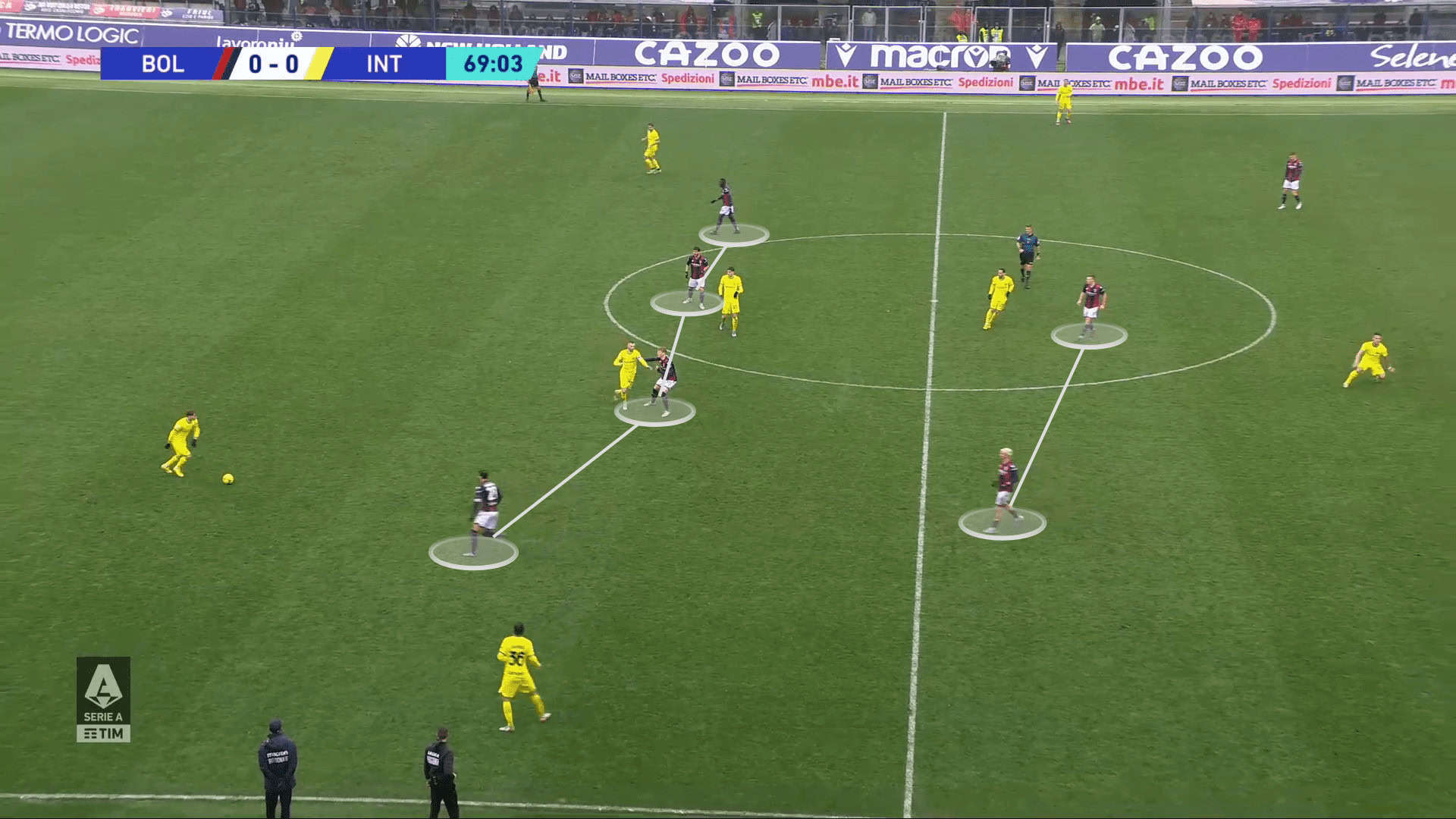
At times, when Scouten would go way up, Domínguez and Ferguson stayed down to cover his left space. Now, the formation shifts to a 4-2-4 with quick pressure on one of the sides.
Schouten’s quick thinking and decisiveness in the centre of the field were unparalleled to his counterparts. He did so without hesitation whenever he was instructed to mark, clearly unafraid of the void he would leave. The defensive prowess of Schouten stands out as the key takeaway from this game.
Why counterattacks were the cherry on the top for the home side
After having a goal disallowed earlier, Bologna were given another opportunity to score just before halftime. About seven Inter players had retreated to defend against a counterattack. A rather small group, with four players, the Bolognese were heavily present at the heart of the transition.
Having Barrow, Domínguez, and Orsolini in parallel allows the cross to get past more defenders without losing its advantageous angle of attack.
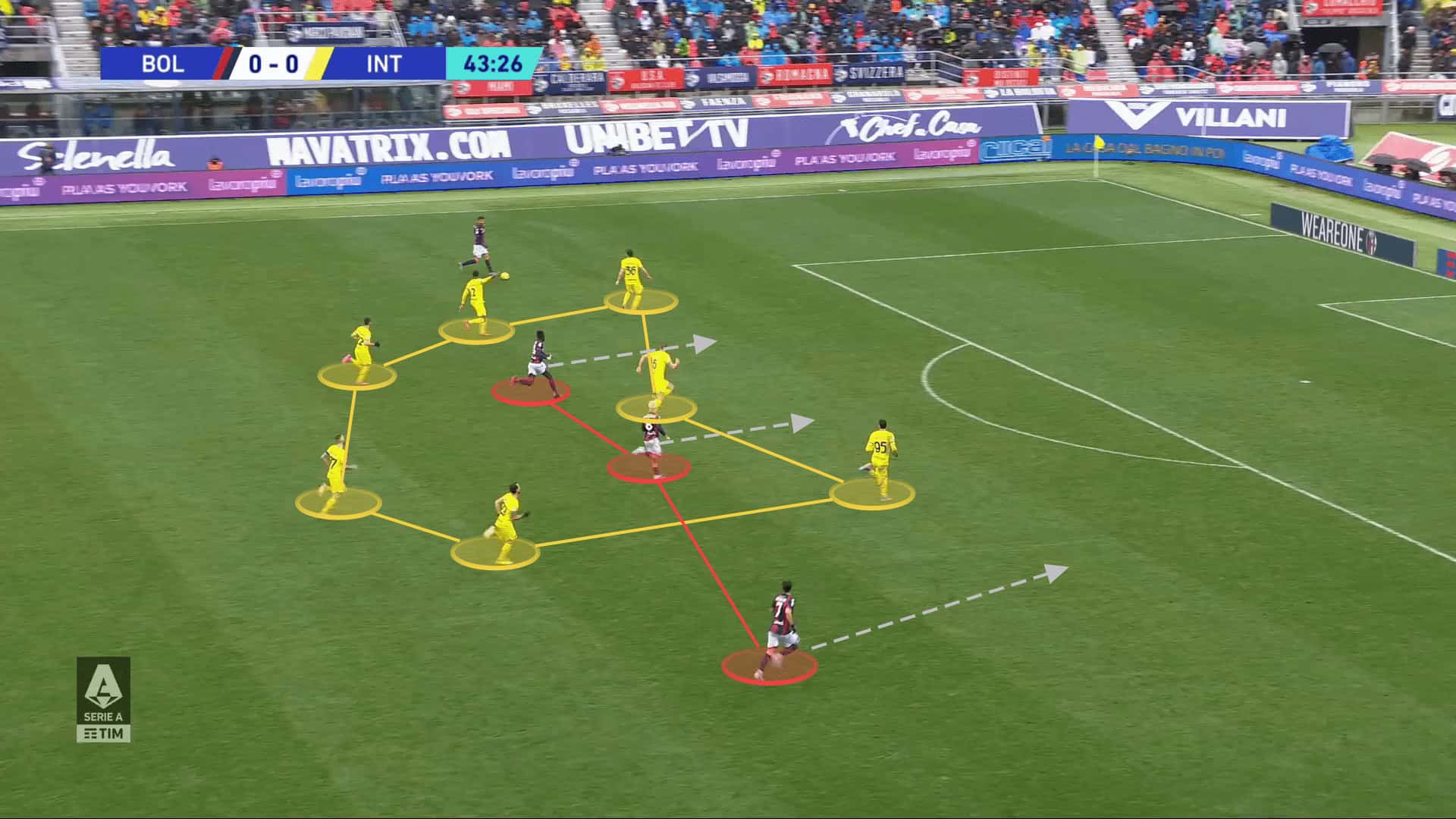
Once, after an interception from Posch, Orsolini made sure to combine with him to give room on the right as seen in the below shot. His first-time flicks helped the team move with no delay which looked like water as it flows.

Schouten, the shrewd Dutchman, helped set up the game’s lone goal. Schouten would not have caught the mispass if not for the press from Dominguez. The holding midfielder got the assist because he was the first to see the winger sneaking into the box as he was racing.
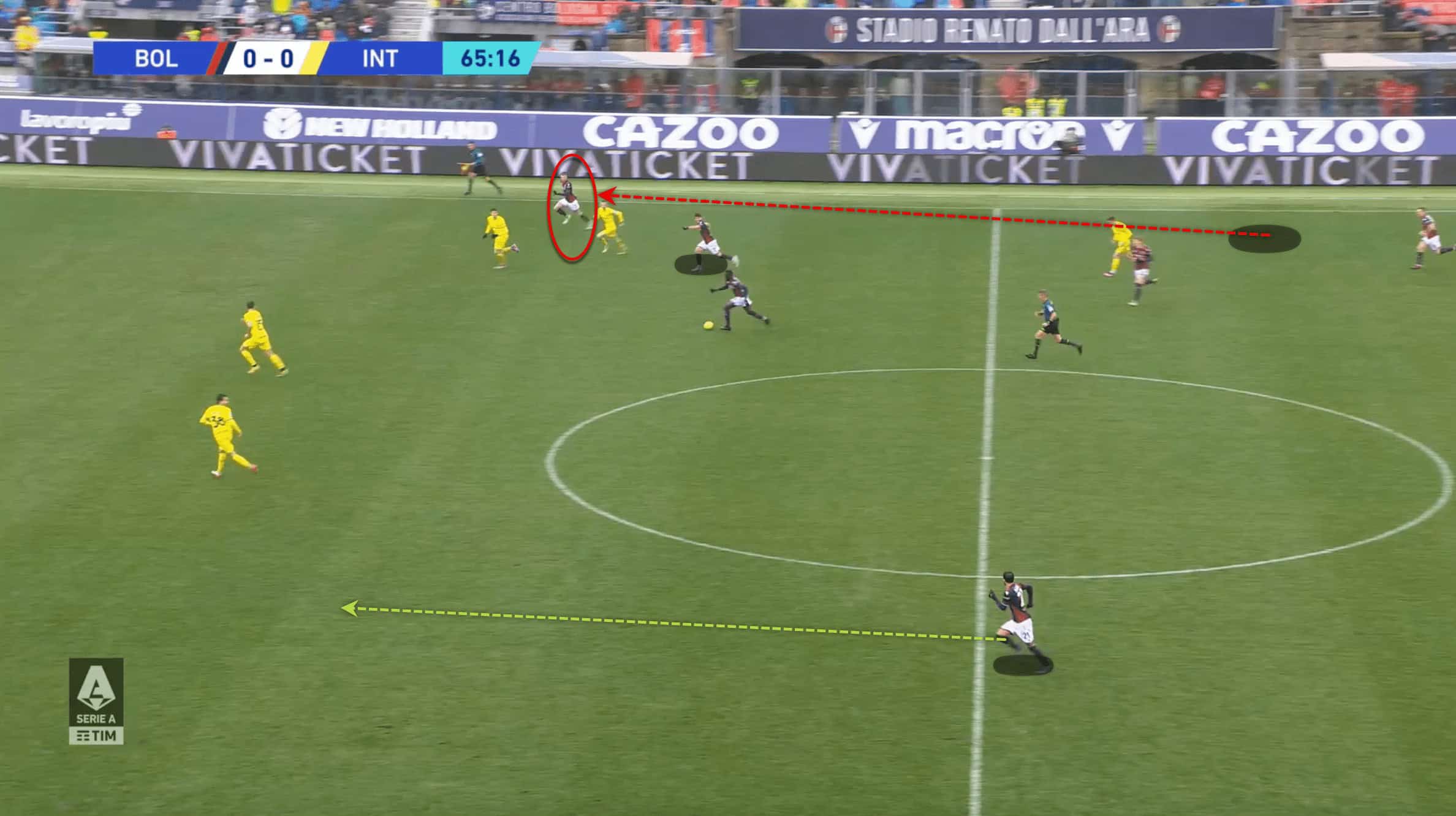
After Barrow receives it in the middle as stopped in the above shot, he sees multiple options including Orsolini rushing on the left and Posch pushing it on the right after which Barrow was overwhelmed and thus loses momentum.
Although this example was not successful in the game, these are the scenarios Bologna worked up frequently to scare Inter. They were never comfortable dealing with these situations. It was utterly unpleasant for Inzaghi’s men.
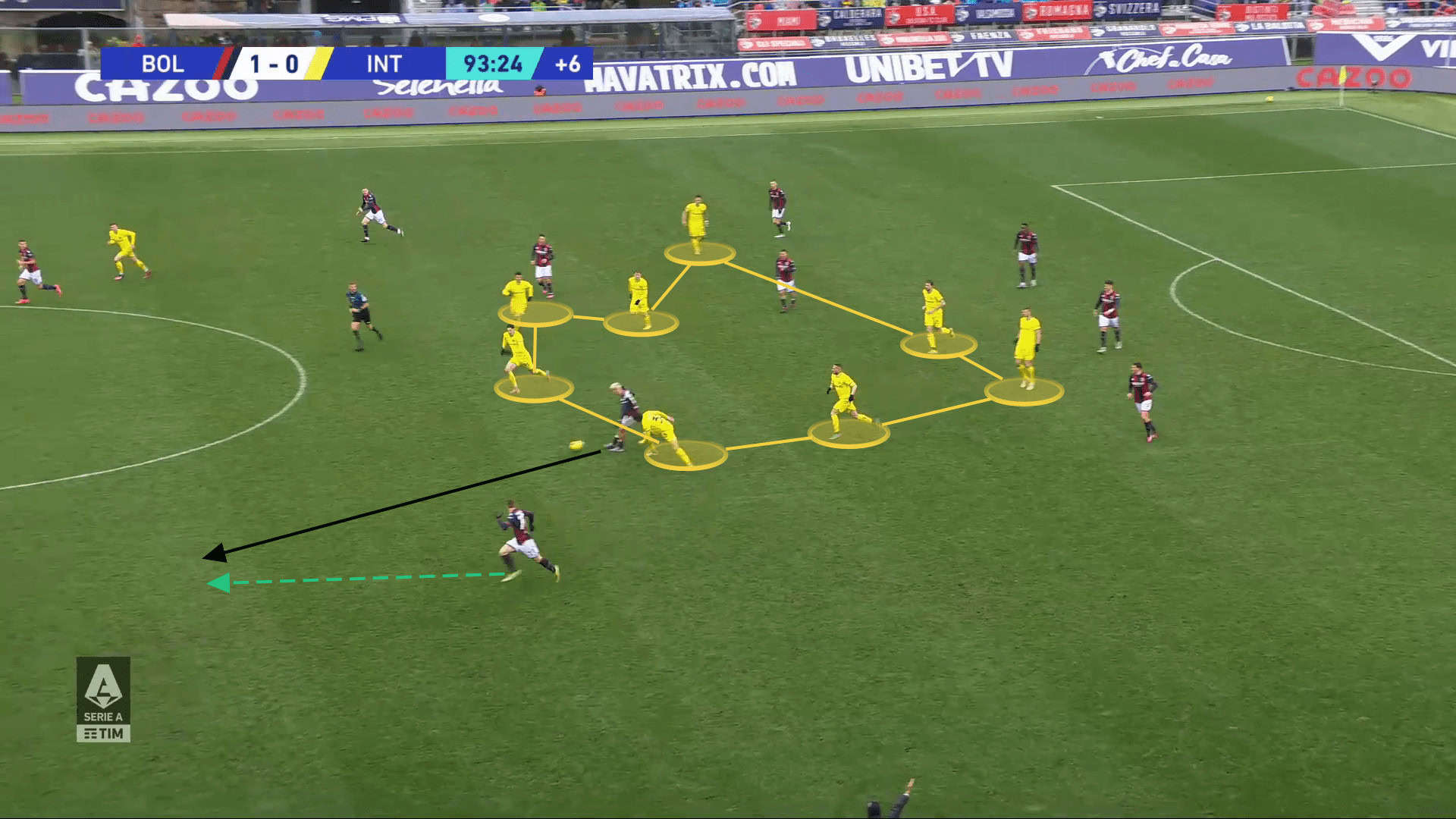
Inter’s press became harsher as the game wound down because they were becoming agitated. Inter were not even close in the last minutes because they failed to win more important situations early.
The pressing defender, whose only job it was to prevent the forward pass for the runner, was fooled by Domínguez’s close control. Domínguez, though, was quick on his feet, and he slick-passed the ball to the sprinting teammate.
To summarise, Inter could not match up with Bologna’s pace and instinctive decision-making at the same time.
Conclusion
The home fans had reason to celebrate thanks to Orsolini’s lone goal while Motta’s group created a frenzy of excitement in Bologna. Motta has altered the spirit inside the group and is the next interesting top player-turned-manager to come along.
After how Schouten displayed his game style, his pinpoint pass to the front set the game’s sole goal. Then, with a subtle touch, Orsolini unleashed a full-volley shot that slammed into the back of the net.
When the players began to glimpse the European experience and a historic season under the ambitious manager, the home crowd went wild, and Motta may have also passed his trial to become the next manager of Internazionale should Inzaghi and the Nerazzurri part ways in the summer.





Comments